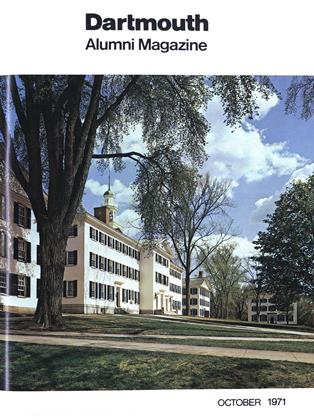THE FEAR OF CONSPIRACY: IMAGES OF UN-AMERICAN SUBVERSION FROM THE REVOLUTION TO THE PRESENT.
OCTOBER 1971 PETER SLATERTHE FEAR OF CONSPIRACY: IMAGES OF UN-AMERICAN SUBVERSION FROM THE REVOLUTION TO THE PRESENT. PETER SLATER OCTOBER 1971
Edited with Commentary byDavid Brion Davis '50. Ithaca: CornellUniversity Press, 1971. 369 pp. $10.
When David Brion Davis was teaching at Cornell in the early 1960'5, he was much admired by the students for the amount of significant information and insight he packed into his lectures. Professor Davis has given a similar performance in The Fear of Conspiracy, providing through a combination of primary sources and interpretative analysis a fascinating picture of the continuing American concern—perhaps, obsession—with alleged secret threats to the well-being of the nation. Those accused at various points in our history of subversive conspiracy include Mormons, Catholics, Jews, slaveowners, abolitionists, immigrants, Wall Street bankers, New Dealers, Fascists, Socialists, Communists, and Masons. The range of sources is also broad, extending from a speech at the obscure New York State Anti-Secret Society Convention of 1870 to opinions of a Supreme Court justice, and from George Washington to Joe McCarthy.
As is virtually inevitable in this sort of book, an occasional section is too short or too long, but overall the editing is excellent. Though in my opinion the last thirty years receive a disproportionate amount of space, non-specialists will probably find the rampant paranoia of these years the most interesting of all. The Fear of Conspiracy contains an index, rare in a collection of primary materials, which greatly increases its usefulness.
Professor Davis' major analytical contribution is a temperate introduction in which he discusses the causes of the recurrent anxiety about subversion and pinpoints its central themes. The editor also provides prefaces for each of the eighty odd primary source selections, and for each historical era. His own position is expressed by his hope that Americans will "come to see intellectual and cultural diversity as a mark of strength instead of evidence of disunity and corruption engineered by malicious subversives."
The most striking phenomenon revealed by this sobering book is the continuity over the centuries in the style and content of the crusades against secret plotters. The Reverend Jedidiah Morse denouncing in the 1790's the supposedly revolutionary Society of Illuminati ("I have, my brethren, an official, authenticated list of the names, ages ... etc. of the officers and members") is recreated in Senator McCarthy (who had an equally dubious list!) denouncing in the 1950's General Marshall and other traitors. For further evidence of the continuity of the paranoid style, the reader should peruse some of the letters that have appeared in the DARTMOUTH ALUMNI MAGAZINE.
An Honors Student under Professor Davis atCornell, Mr. Slater, Assistant Professor ofHistory at Dartmouth, teaches courses inAmerican Intellectual History.
 View Full Issue
View Full Issue
More From This Issue
-
 Feature
FeatureThayer School's Centennial
October 1971 By WILLIAM P. KIMBALL '28 -
 Feature
FeatureOMBUDSMAN
October 1971 By MARY ROSS -
 Feature
FeatureDartmouth Art Show in Boston
October 1971 -
 Feature
FeatureSummer '71: Diligent Diversity
October 1971 -
 Article
ArticleFaculty
October 1971 By ROBERT B. GRAHAM '40 -
 Article
ArticleBig Green Teams
October 1971
Books
-
 Books
BooksMoral Sanitation
November, 1916 -
 Books
BooksThe Home Road
April 1924 By F. P. E. -
 Books
BooksLaw of the Jungle
NOV. 1977 By JOHN S. RUSSELL JR. '38 -
 Books
BooksAMERICAN DEMOCRACY IN THEORY AND PRACTICE. THE NATIONAL GOVERNMENT
October 1951 By Landon G. Rockwell '35 -
 Books
BooksProselytizers and Profiteers
May 1977 By LEO SPITZER -
 Books
BooksEGYPT AND THE SUDAN.
JULY 1967 By ROBERT G. LANDEN

